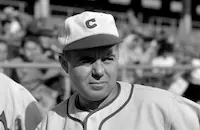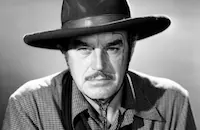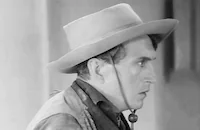Big City

Brief Synopsis
Cast & Crew
Frank Borzage
Luise Rainer
Spencer Tracy
Janet Beecher
Eddie Quillan
Victor Varconi
Film Details
Technical Specs

Synopsis
New York cabbie Joe Benton and his Russian-born wife Anna have a loving marriage, despite their constant teasing. Joe and Anna's brother, Paul Roya, are both independent cab drivers who are at odds with the large Comet Cab Company. After Paul is beaten up by some Comet cabbies, he decides to be a "double agent" and infiltrate the company. Beecher, a labor agitator, is hired by Comet to foment trouble among the independents and secretly works with Buddy, a friend of Joe and Paul's. On the night of Anna's birthday, Anna, who is pregnant, asks Buddy to take a raincoat to Paul, who is working late. When Buddy turns up at the garage, Beecher is angry with him for being there, then takes the box with the raincoat from him. Meanwhile, the night watchman finds a bomb in the garage and, seeing Paul there, thinks that he is the bomber. He then shoots and kills Paul just before the bomb goes off, terrifying Buddy, who did not know that he would be involved in serious violence. At the inquest, Beecher accuses Anna of transporting the bomb to Paul in the box with the raincoat. Though District Attorney Gilbert does not believe that Anna is involved in the bombing, he feels that Beecher will use the incident to his political advantage, and so decides that Anna should be deported. At Paul's funeral, government men try to take her away, but she escapes, aided by her friends. Because they do not want her to be deported, all of her friends decide to take turns hiding her from the authorities. After some time, the district attorney, supported by the mayor, decides to offer amnesty to cabbies if they voluntarily turn Anna in. No one takes advantage of the offer, but soon detectives follow Joe to the home of Jim and Sophie Sloan, who are currently hiding Anna. Though the detectives only find Grandpa Sloan in the house, they know that Anna has been there, and the district attorney decides that he will arrest all of the cabbies for the bombing. Anna cannot stand to think of her friends suffering to protect her, so she calls the mayor to see if his amnesty offer is still available. When he says yes, she tells him where she is staying and waits for the authorities. At the boat that will take her back to Europe, Joe comes to visit Anna and promises to meet her there, but she tells him that she wants him to stay in America. When he leaves, he and his friend, Mike Edwards, find Buddy and discover that he is being paid to keep quiet about the bombing. They then force him to come with them while they look for the mayor and the district attorney. They track the mayor down at Jack Dempsey's restaurant, where he and the district attorney are attending a banquet with a number of famous athletes. After Joe and Mike force Buddy to confess in front of the dignitaries, Joe pleads with the mayor to do something quickly to save Anna. Everyone at the banquet then rushes to the pier, where they arrive just before the boat is about to sail. As Anna is being taken away from the boat, she says that she is about to give birth and an ambulance is summoned. While she is giving birth, the Comet cabbies decide to teach the independent cabbies a lesson, and a fight breaks out in which the mayor, Dempsey and other athletes join Joe in teaching the Comet cabbies a lesson. A few days later, when Joe and Anna christen their baby, he is given dozens of names to honor all of their friends.

Director

Frank Borzage
Cast

Luise Rainer

Spencer Tracy

Janet Beecher

Eddie Quillan
Victor Varconi
Oscar O'shea
Helen Troy

William Demarest

John Arledge

Irving Bacon

Guinn Williams

Regis Toomey
Edgar Dearing

Paul Harvey
Andrew J. Tombes

Clem Bevans

Grace Ford

Alice White
Jack Dempsey
James J. Jeffries
Jimmy Mclarin
Maxie Rosenbloom
Jim Thorpe
Frank Wykoff
Jackie Fields
Man Mountain Dean
Gus Sonnenberg
George Godfrey
Joe Rivers
Cotton Warburton
Bull Montana
Snowy Baker
Taski Hagio

Edward James Flanagan

Russell Hopton

Ray Walker
Helen Brown
Natalie Garson
Robert Mckenzie
Joseph King
Dewey Robinson
Stanley Andrews

Joseph Crehan
Edward Gargan

Eddie Gribbon
Mitchell Lewis
Alonzo Price
Richard Tucker
George Skultesky
Landers Stevens
Herbert Ashley
Eadie Adams
Matt Mchugh

Harry Woods

Paul Fix
Jules Cowles
Mahlon Hamilton
Dick Rush
Ralph Bushman
Will Stanton
Dick Rich
Jack Pennick
Robert O'connor
Robert Brister

James Flavin
Frank S. Hagney
Lew Harvey
Orville Caldwell
Paul Newlan
Sam Ash
Maine Geary
Jack Dougherty
Barbara Bedford
Jack Daley
Gladden James

Ruth Hussey
Lowden Adams
Eric Wilton

Lee Phelps
Frank Dufrane
Charles Mcmurphy
Leigh Delacy
Lester Dorr
Nick Thompson
Harry Semels
Matty Roubert
Tom Dugan
Larry Wheat
Jack C. Grey
Jack Hutchinson
Lillian Nicholson
Lillian Worth
George Chandler
Don Sugai Matsuda
Neal Glisby
Monya Andre
Abdullah Abbas
Crew
Dr. William Axt
Frank Borzage
Lew Borzage
Hugo Butler
Clyde De Vinna
Cedric Gibbons
Norman Krasna
Norman Krasna
Jay Marchand
Stan Rogers
Joseph Ruttenberg
Dore Schary
George B. Seitz
Douglas Shearer
Fredrick Y. Smith
Leon Stewart
Dolly Tree
Edwin B. Willis

Videos
Movie Clip



Trailer
Film Details
Technical Specs

Articles
Big City (1937) - Big City
Rainer had been a popular stage actress in Berlin and Vienna in the early 1930s, working in Max Reinhardt's company, when she was spotted by an MGM talent scout. He wired studio boss Louis B. Mayer that he had found the next Garbo, and offered Rainer a contract. She won rave reviews for her first MGM film, Escapade (1935), and followed that with her award-winning performance in The Great Ziegfeld. But after the Good Earth, and the death of MGM production chief Irving Thalberg, Mayer didn't know what to do with Rainer, and none of her subsequent films were successful. In 1938, she broke her MGM contract and moved to New York with her then-husband, playwright Clifford Odets. The marriage ended in 1940, and after World War II, Rainer remarried and moved to London, acting only occasionally in television, and, in 1997, in a film version of Dostoyevsky's The Gambler.
Spencer Tracy signed a contract with MGM the same year as Rainer did, but unlike her skyrocket rise and quick fall, his career at the studio had a steadier ascent. He had already been nominated once for an Academy Award, for San Francisco (1936), and on Oscar® night in 1938, both he and Rainer won the top awards for two 1937 films, with Tracy winning for Captains Courageous. The following year, Tracy would duplicate Rainer's feat of winning two years in a row, when he again took home the best actor trophy for Boys' Town (1938). Throughout the 1940s and '50s, Tracy remained one of Hollywood's busiest and most respected actors, and only slowed down due to ill health, finishing his final film, Guess Who's Coming to Dinner (1967) just 17 days before his death.
Director Frank Borzage's career was at its peak in the late 1920s and '30s. Not surprisingly for the director who was known as the screen's great romantic, the best parts of Big City are the love scenes, and the way his camera lovingly presents Rainer. According to Frederick Lamster's study of Borzage's work, "Visually, the most striking aspect of this film is the use of light and shadows. Anna is often shot in softly glowing light, such as that produced by candles. When she is placed on board the ship that will carry her back to Europe, the use of extreme close-ups and the 'over-hanging' shadows echoes her isolation and the unknown future that she is facing." At MGM from the mid-1930s through the early 1940s, Borzage was the ideal director for Margaret Sullavan's tremulous emotionalism in three romantic dramas, including two early anti-Nazi films, Three Comrades (1938) and The Mortal Storm (1940). He also guided Joan Crawford to two of her best overlooked performances, in Mannequin (1938) and Strange Cargo (1940). His career slowed down in the late 1940s, and he made his final film, The Big Fisherman, in 1959.
Reviews for Big City were dismissive. Variety called it "a big mistake...The letdown is greater because of the superlative talent wasted on trivialities." Frank Nugent in the New York Times added, "It is not we must repeat exactly the sort of thing one would expect Metro to award to its academy winner." Luise Rainer apparently agreed. In an October, 2009 interview with a British newspaper, Rainer, approaching her 100th birthday, wasted few words on the film. Spencer Tracy, she said, was "a terribly nice man." Big City, not so much: "an idiotic film."
Director: Frank Borzage
Producer: Norman Krasna
Screenplay: Dore Schary and Hugo Butler, based on an original story by Norman Krasna
Cinematography: Joseph Ruttenberg
Editor: Fredrick Y. Smith
Art Direction: Cedric Gibbons
Music: William Axt
Cast: Spencer Tracy (Joe Benton), Luise Rainer (Anna Benton), Charley Grapewin (The Mayor), Janet Beecher (Sophie Sloane), Eddie Quillan (Mike Edwards), Victor Varconi (Paul Roya), Oscar O'Shea (John C. Andrews), Helen Troy (Lola Johnson), William Demarest (Beecher).
BW-81m.
by Margarita Landazuri

Big City (1937) - Big City
Quotes
Trivia
Notes
According to a news item in Hollywood Reporter, the "Jack Dempsey Sequence," was filmed by Clyde De Vinna in New York, under George Seitz's direction. The sequence featured many popular sports figures of the day portraying themselves. Jack Dempsey's restaurant was a popular New York restaurant in the 1930s. This was the first film of actress Ruth Hussey (1911-2005), who was listed in the CBCS, as one of the mayor's secretaries, under the name Ruth March. Hussey, who received her first onscreen credit in Madame X, released on October 1, 1937 (see AFI Catalog of Feature Films, 1931-40), was never billed onscreen as anything other than Ruth Hussey.















